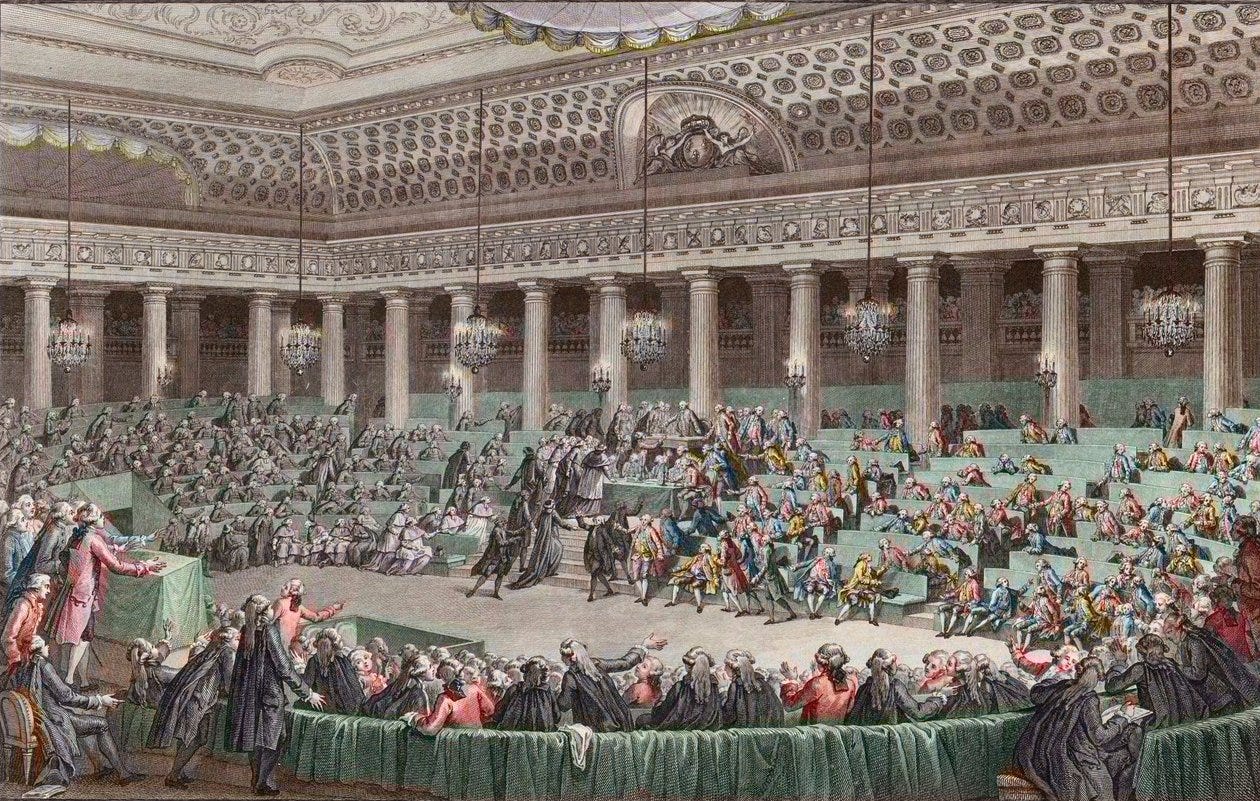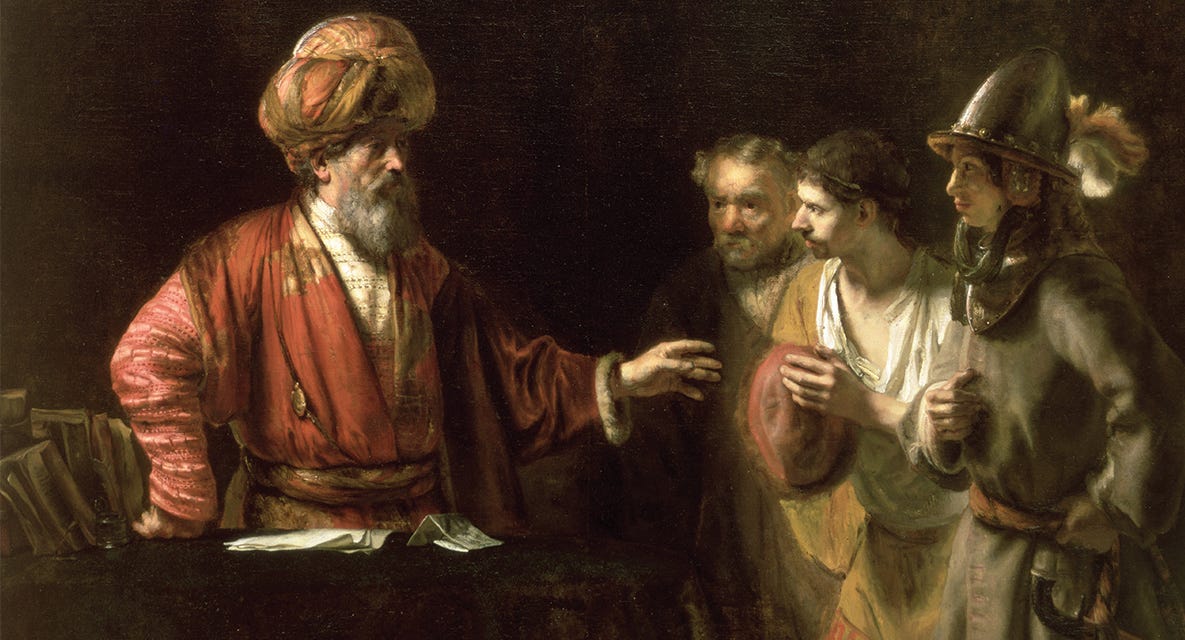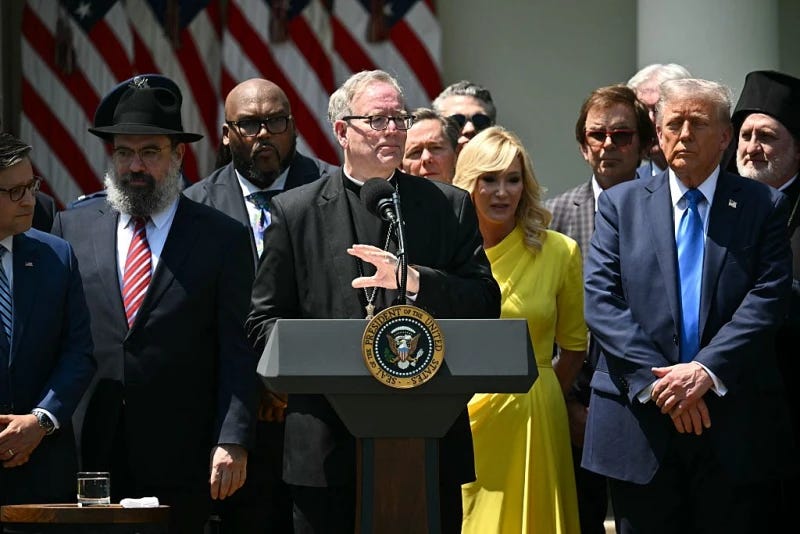Can the Christian Right save the Catholic Church?
How Catholics can capitalize on this political moment
On Sunday, a memorial was held for Charlie Kirk, drawing tens of thousands of people, including almost every member of the Trump administration.
The speeches were striking—the Vice President of the United States stood up and declared that Christ is King. But this display made some Christians uncomfortable. Some are afraid the Gospel message is being used to advance a political agenda.
Fortunately, the Gospel reading from this Sunday speaks directly to this issue.
The New Christian Right
For those paying attention, a shift has taken place in American political attitudes toward religion. For years, both the American left and the American right were indifferent towards religion. They would use Christian rhetoric when it suited them, but abandon it when it didn’t.
Recently, that indifference has changed.
The American left has become more hostile to Christianity. It started with small slights exemplified by Obama’s famous “clinging to guns and religion” line. Over the decades, it has grown into the destruction of churches and actual acts of violence.
“[These] small towns in Pennsylvania […] they cling to guns or religion or antipathy toward people who aren’t like them or anti-immigrant sentiment or anti-trade sentiment as a way to explain their frustrations.” - Barack Obama
Those who understand liberalism knew this would happen. The concept of a “left-wing” dates back to the French Revolution. The right wing was in favor of the throne and altar. The left wing wanted to tear it down. To maintain itself, the left wing must “progress.” Even by violence if necessary.
Despite all its flaws, the American right is responding to this hatred with an embrace of Christianity. Its indifference has been shaken off.
We’re now seeing a rise in Christianity among young conservatives. College campuses are reporting a rise in converts who first became conservative and then decided to become Catholic.
Many Christians are wary of this. They don’t want people converting for the wrong reasons. I understand that fear, but it is misplaced. If Christians give in to that fear, we would give up one of the greatest opportunities to further the kingdom of God in our country.
Internalized Liberalism
American Christians have adopted the liberal understanding of “separation of Church and State” (which is not in our constitution) that prohibits the Church from helping the State and vice versa. We thought this would empower the Church and State to flourish independently of one another. But just like the Body does not flourish without the Soul, neither does the State flourish without the Church.
It is a simple truth—hard for Americans to accept—that the power of the State belongs to Christ by right (see Mt. 28:18, Jn 19:11). Therefore, the power of the State ought to be used to further the Kingdom of God.
More specifically, the State should be run by true Christians and run in an explicitly Christian way. Many Christians hear this and immediately think of forced conversions and inquisitions. Instead, we should think of universities, hospitals, care for the poor, and thriving parishes. When temporal power is wielded by a virtuous Christian, that temporal power does more good. That is self-evident.
For the past three centuries, Christians have been slowly convinced the State ought to be secular and run by a secular moral code. Today, more people are waking up to where that moral code leads. It leads to degradation into sexual deviancy, crime, and violence.
American Christians face a choice: Do we accept the liberalism that led us here, or do we embrace Christianity in politics?
Right now, the answers seem to fall along party lines. The left has embraced liberalism, and the right is beginning to reject it.
So, how do we as a Church treat the American right?
The Reality of Power and Its Use
Some Christians fear that if we increase Christian power and establish rules favoring Christianity, someday that power will be taken away and used against us.
But it’s too late—that’s already happened.
We already have a society where rules favor non-Christianity and atheism. We have Supreme Court rulings establishing rights to gay marriage and legal precedents prohibiting certain expressions of Christianity. We’ve had government mandates close our churches.
Power is one of four things Thomas Aquinas identified as things that can corrupt our souls and act as “replacements” for God—the others being wealth, pleasure, and honor. Monastic religious reject all four completely and live in poverty, chastity, and obedience. But when you live in the world, as you and I do, these four things are part of daily life.
Christians fear corrupting the gospel to advance a political agenda. Which is fair—God is not a means to attain power (or pleasure, wealth, and honor.) But power still exists and is used. So how do we use it?
Christ answered that question in the Gospel reading this Sunday.
The Dishonest Servant
Sunday’s gospel was Jesus’s parable about a dishonest servant who squanders his master’s money. When he realizes he is about to be fired, he goes to all his master’s debtors and settles their accounts for half of what they owe. He does them a favor so one of them will do him a favor.
Jesus says this was clever. He says, “Make friends with dishonest wealth,” a strange saying to hear from the Lord.
The servant is the Christian, the master is the Lord, and the debtors are the worldly—the rich, the powerful, the honored—who owe God so much debt they cannot repay. It is our responsibility to go to those debtors and convince them to give some of their worldly goods to God, to advance our Master’s purpose. If they do that small gesture, God will be more willing to forgive their entire debt.
It is our responsibility to make sure the powerful use their power to advance the kingdom. That includes politicians.
The American political system is powerful. For the past four years, it’s been used to advance an anti-gospel agenda. It will either be used to advance the gospel or not—those are the two options. So why not use it to advance the gospel?
Christ adds a caveat that will put nervous Christians at ease: You cannot serve both God and Mammon. You cannot serve both God and temporal goods. Power, wealth, pleasure, and honor are temporal goods that ought to be used, not served. To adapt a saying: power is a good servant, but a bad master.
There will always be a “wealthiest man in the world.” That man ought to be Catholic. If he becomes Catholic, will he relinquish his wealth? Maybe that’s what God is calling him to do, but maybe not. More likely, God is calling him to use that money to advance the kingdom of God.
Likewise, there will always be world leaders—shouldn’t those world leaders be Catholic and use their power to advance the kingdom of God?
The Catholic Church’s Opportunity
Some fear the rise of the Christian right will harm Christianity. The greater danger is that we squander this opportunity. For too long, the Catholic Church in America has been afraid of being political and controversial.
But here’s the reality: one portion of this country wants the Catholic Church to be destroyed, and another portion wants us to grow. We should work with the portion that wants us to grow. The Catholic Church doesn’t fit 100% with the Christian Right—it just doesn’t. But they are willing to work with us, so we have an opportunity.
Like the dishonest servant, we need to convince the Christian Right to use its power to advance the Kingdom. They owe God a lot. They have capitulated on gay marriage, on abortion, on unnecessary wars, and so on. If the Church convinces them to pay back some of that debt, God may have mercy on them.
The Christian Right cannot save the Catholic Church. The Church does not need saving. But the Catholic Church can save the Christian Right.
We cannot lose sight of the eternal goal. We work with the powerful so we can save the powerful. The Catholic Church needs to capitalize on the openness of the Christian Right, not just to advance the Kingdom of God on earth, but also to gain more souls for the Kingdom of God in Heaven.







I wrote a similar article about this secularization in Canada
https://andrewh8.substack.com/p/secularism
In that we must reject the calls for secularism as a false religion and false "tolerance".
We must push for Christian communities.
No